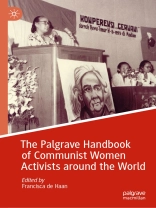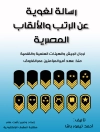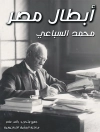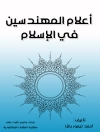This Handbook addresses the role of women in communism as a global, social and political movement for the first time, exploring their lives, forms of activism, political strategies and transnational networks. Comprising twenty-five chapters, based on new and primary research, the book presents the lives of self-identified communist women from a truly international perspective and outlines their struggles against fascism and colonialism, and for women’s emancipation and national liberation. By using the lens of transnational political biography, the chapters capture the broader picture of these women’s lives, unpacking the links between the so-called public and private, the power structures and inequalities of their societies, the formal networks and politics in which they were involved, and the informal connections and friendships that supported their activism both at the national and international level. Challenging androcentric and Eurocentric narratives about communism, this Handbook reveals the active and significant roles of women in nineteenth- and twentieth-century communist movements and regimes, and highlights the importance of communist women in shaping the agenda for women’s rights worldwide.
Tabela de Conteúdo
1. Introduction: Towards a Global History of Communist Women; Francisca de Haan.- Part I: Global Foremothers .- 2. Clara Zetkin (1857–1933): A Rebel Building the Socialist and Communist International Women’s Movements; Florence Hervé .- 3. Alexandra Kollontai (1872–1952): Communism as the Only Way Towards Women’s Liberation; Natalia Novikova and Kristen Ghodsee.- 4. A Right to be Radical: Claudia Jones (1915–1964) and the “Super-Exploitation of the Black Woman’; Carole Boyce Davies.- Part II: Europe .- 5. Helen Crawfurd (1877–1954): Scottish Suffragette and International Communist; Kiera Wilkins.- 6. Ana Pauker (1893–1960): The Infamous Romanian Woman Communist Leader; Stefan Bosomitu and Luciana Jinga.- 7. Dolores Ibárruri, Pasionaria (1895–1989): Communist Woman of Steel, Global Icon; Mercedes Yusta Rodrigo.- 8. Teresa Noce (1900–1980): A Communist “Professional Revolutionary” in Twentieth-Century Italy; Eloisa Betti and Debora Migliucci.- 9. Edwarda Orłowska (1906–1977): A Story of Communist Activism in Poland Told in Words and Silences; Katarzyna Stańczak-Wiślicz.- 10. Nina Vasilievna Popova (1908–1994): “Woman in the Land of Socialism”; Alexandra Talaver.- Part III: Asia.- 11. Deng Yingchao (1904–1992): A Feminist Leader in the Chinese Communist Party; Wang Zheng.- 12. Pak Chŏng-ae: From Red Labor Unions to the Korean Democratic Women’s Union; Suzy Kim.- 13. Iijima Aiko (1932–2005): A Feminist’s Fight Against Discrimination in Japan; Akiko Takenaka.- 14. Nguyễn Thị Bình (b. 1927): “The Flower and Fire of the Revolution”; An Thuy Nguyen.- 15. Umi Sardjono (1923–2011) and the Quest to Build a New Society for Indonesian Women; Katharine Mc Gregor and Ruth Indiah Rahayu.- 16. Behice Boran (1910–1987): A Committed Communist Woman in Cold War Turkey; Sercan Çınar.- Part IV: Africa and the Middle East.- 17. Naziha al-Dulaimi (1923–2007) and the Anticolonial Struggle in Iraq; Noga Efrati.- 18. “Not Only the Country’s Independence, Mine Too!” Arlette Bourgel, an Algerian Jewish Communist (b. 1928); Pierre-Jean Le Foll-Luciani.- 19. Aoua Keita (1912–1980): Anti-Colonial Activist, Nationalist Politician, and Feminist in Mali (West Africa); Pascale Barthélémy and Ophélie Rillon.- Part V: Oceania.- 20. “A Key Person Internationally”: Freda Brown (1919–2009), Australian Activist; Lisa Milner.- 21. Dancing for the Revolution: Rona Bailey, New Zealand Artist Activist (1914–2005); Cybèle Locke.- Part 6: The Americas.- 22. Jeanne Corbin (1906–1944): A Canadian Communist Militant in a Man’s World; Andrée Lévesque.- 23. Elizabeth Gurley Flynn (1890–1964): Mortal Enemy of Capitalism; Lara Vapnek.- 24. Gachita Amador (1891–1961), Between Two Loves: Communist Action and Guignol Theater; Verónica Oikión Solano.- 25. Vilma Espín (1930–2007): Forging a New Woman Within the Cuban Revolution; Ailynn Torres Santana and Michelle Chase.- 26. “When My Life Goes Out …” Biography of the Argentinian Communist Activist Fanny Edelman (1911–2011); Adriana Valobra and Natalia Casola.
Sobre o autor
Francisca de Haan is Emerita Professor of Gender Studies and History at the Central European University in Vienna, Austria, and Fellow at the International Institute of Social History in Amsterdam. Her research interests center on transnational women’s history and gender history, histories of inter/transnational women’s movements, socialist and communist women’s political activism, women’s work and women’s archives.












